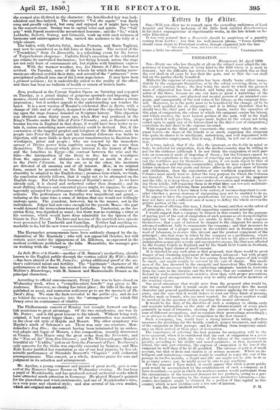Zora, produced at the Covent Garden Opera on Saturday and
repeated on Tuesday, is a grand display of gorgeous spectacle and imposing har- monies, choral and orchestral. On the eye and the ear it makes a strong impression ; but it neither appeals to the nor touches the heart. It is a new version of Rossini's celebrated Mose in Plitt°, with a change of title and of subject, designed to obviate the objection to bring- ing upon the stage dramas founded on Scripture history. This objection was obviated some thirty years ago, when Mose was produced at the King's Theatre under the title of Pietro l'Enetnita ; and, as Rossini's work became known in England in. that shape, it would have been better to re- tain it, unless something more satisfactory could be devised. But, if the conversion of the inspired prophet and lawgiver of the Hebrews and his people into Peter the Hermit and his fanatical followers was liable to objection, still more liable is their present transformation to Bactrian fire- worshipers, priest and people ; who are rescued by the immediate agency of Divine power from captivity among Pagans no worse than themselves. The element which gives interest to the history of Moses and the Israelites in Egypt—the contrast between the true and the Mee—die interposition. of the Deity to free his true worshipers from. the oppression of idolaters--is destroyed' as much. in Zara as in the. Pisan rEremita. Dr the one as in the other, the incidents are divested of all meaning and of all interest. Mose,. in its, original. form, cannot be presented on the English, stage;. it cannot without absurdity be adapted to the English stage ; premises from which, we think, the conclusion strictly follows,, that it ought not to be attempted on. the English stage. But what then becomes of Rossines.musie? As we have &heady said, it is choral' and orchestral' rather than &emetic ; and its most staling choruses and concerted pieces might, we imagine, be adtan- tageonsly arranged for peribrintince without action, in the manner of an oratorio. The performance' on Saturdky was magnificent and grand,— induoing at the same time a sense of fatigue that one would not willingly undergo again. The grandeur, huwoves lay in the messes, not in the individuals. Zelgex had. notnice enough forthe pseud) Moses—the part would, demand the treinendonsetenes.of Lehlaehe. 'famburini, as the As- syriawKing, was-dignified, as usual ; but there was-no resisting a titter at his costume, which would have done admirably for the Queen of the Giants in Tom Thumb. The hero and heroine of the mawkish love episode were personated by Tamberlik and Castellani Neither had anything re- markable to do, but the new tenor occasionaRy displayed power and passion.


























 Previous page
Previous page